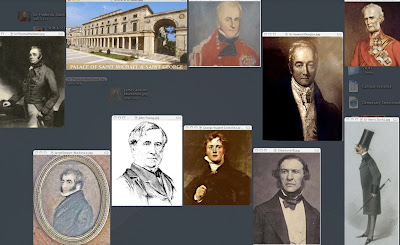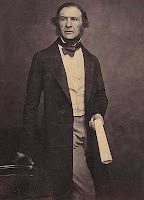
I was delighted to accept Richard Pine’s invitation, to give a chat at the Durrell School in Philhellene Street in a few weeks - Wednesday 3 February. In Richard's words "7.30 glass of wine, 8pm talk, finish by 9pm".
I'm delving into the varying characteristics of different Lord High Commissioners of the Ionian Islands between 1815 and 1864, relying on sorties in the National Archives at Kew, on the early chapters of Diana Markides and Robert Holland The British and the Hellenes and, of course, on Eleni Calligas’s brilliant 1992 thesis – unpublished - that has brought together rich information about personalities in the Ionian political classes during the British Protectorate.
I have a portrait of Thomas Maitland, the graceless aristocrat, who in 1817 wrote a constitution for the Ionian Islands that made them more an English possession than the Protectorate, intended and agreed, in 1815.
There’s one of his successor Frederick Adam, whose statue stands outside the Protectorate's seat of government - The Palace of St Michael and St George at the head of the Liston - a man more congenial to Ionians, married to a Greek, he oversaw the building, for her, of a delightful neo-classical house, Mon Repos, in lovely grounds a mile south of the Commissioner's Palace.
I’m missing a picture of Alexander Woodford, acting Lord High Commissioner for part of 1832. I have found one of the whig intellectual Lord Nugent, keen to implement the liberal principles of his party, who became vexed when the Ionian politicians to whom he’d granted greater freedoms failed to observe his wishes.
 |
| Andrea Mustoxidi |
I’ve also found one of his successor Sir Howard Douglas who sparred with a new class of Ionian parliamentarian in Andrea Mustoxidi - Ανδρέας Μουστοξύδης - intellectual, scholarly, politically astute, back from Italy enthused by republican ideas of liberty and equality brewing across the rest of Europe, by the outcome of the Greek War of Independence, the founding of the Hellenic nation and the idea of Ionian autonomy - these last two being visions that became contentiously separate in the following decades.
I’ve also a sketchy portrait of James Stewart-Mackenzie, and far better painting of his notable successor - an older portrait - of the exceptional John Colborne, Lord Seaton, a radically inclined Tory who at last dissolved Maitland’s colonial constitution and replaced it with ‘the Seatonian’, acting on the principle that power should be linked to the wishes of the electorate rather than of the Palace of St.Michael and St.George. For Seaton, Maitland’s style of government, far from being justified by Ionian venality and incompetence, was in large degree its cause. He was unique among commissioners in seeing economic problems at the heart of social discontent in the islands - exploited by many years of Venetian mono-cropping (olives in Corfu, currants in Zakinthos and Cephalonia).
 |
| Giuseppi Momferrato |
The Tory in Seaton saw that by opening government to the parliamentarian liberali, he strengthened the Protectorate and undermined the campaigning zeal of the emerging radicals, the rizospastai, pressing for the departure of the British and the creation of a sovereign Ionian Republic – a political movement driven from Cephalonia – one of its leaders, the zealous and principled Elias Zervo in alliance and friendship with Giorgio Lunzo and Giuseppe Momferrato and others whose names and character I have yet to learn.
 |
| Elias Zervo |
Seaton’s policies were harmed by the personality of his inherited resident, kept on instructions from London, on Cephalonia – Selwyn D’Everton - whose views on the readiness of Ionians for self-government were out of harmony with Seaton’s.
The irony of Seaton’s tenure as Commissioner was that his efforts to strengthen the hand of the liberali added to the momentum of the rizospasti who were not as distinct from the liberali as he might have hoped. The first outbreak of violence on Cephalonia in 1848 was, as Seaton recognized, a reaction against oppression and poverty imposed by local landowners, but it was used by the radicals to argue a philosophical case against the British. By enforcing the law on behalf of the signorini the British pushed Ionians enfranchised by Seaton’s reforms into the camp of the radicals.
 |
| The Rizopastai |
I’m missing a picture Sir Henry George Ward, successor to Seaton, keen to continue reforms that favoured the wishes of the liberali, but faced with the murder by peasants of two landowners' employees on Cephalonia, Ward ordered military intervention resented to this day as a violent overreaction – a reminder of the fist in the glove that could be wielded by the British on behalf of the Ionian ruling class in whom they often recognized their strongest allies. There were hangings and floggings on Cephalonia – the latter penalty unfamiliar to Ionians and therefore additionally a focus of horror and widespread contempt and loathing for the Lord High Commissioner across the islands. There were good newspapers; many radical. News spread far more quickly along the islands than between London and Corfu.
Nonetheless Ward’s repression may have been a winning card for those British politicians and diplomats preoccupied with maintaining strategic power in the Eastern Mediterranean via influence on Greece. The dominant voice of the rizospasti, Elias Zervos, was silenced first by banishment to Orthoni, just off the north west coast of Corfu, but then by far more distant exile to Kythera, the southernmost of the Ionian islands, below Methoni in the Peloponnese.
 |
| Constantinos Lombardo |
A way was cleared for the rise of Constantinos Lombardos from Zakinthos, a more opportunist politician who focused the energies of the rizopasti not on republican principles like Zervos, but on enosis - the transfer of the islands to the young kingdom of Greece.
I’ve a portrait of Ward’s successor Sir John Young. He was perhaps the most direct victim of the fact that Ionians were not restricting their political energies to the region. Islanders had come in delegations to London complaining directly to British ministers and MPs about the conduct of the Lord High Commissioner and his agents, cultivating support in London, and indeed the rest of Europe. There was a long tradition of Greek and British political intermingling, distinguished exemplars being Ioannis Kapodistria and later Giorgos Theotokis, who were able to navigate shrewdly amid the differences of opinion on Greece in the British political classes.
Thus, amid the accelerating trajectory of his career as one of England’s most distinguished statesman, William Gladstone, came on an extraordinary mission to Greece and the Ionian islands, convinced that most of the problems of the Protectorate lay with British policies that had blocked the emergence of a mature democracy there.
This didn't mean he came with the intention of abandoning the British Protectorate. To understand why the British government held so keenly to the Ionian islands I must recognise the motives of every power that has relied on Corfu as a military base.
Stand, on a clear day, on the summit of Angelocastra, (see this in another blog) above Paleokastritsa, from where Linda and I have gazed across fifty miles, maybe more, of the southern Adriatic – defended for three centuries by Venice, coveted in the mid-19th century by the Austro-Hungarian empire, linked in a conflux of Balkan contracts that policy-makers in Whitehall and the clubs off Pall Mall referred to as ‘The Eastern Question’, calculating whether to guard our interest in the Eastern Mediterranean via fledgling Christian states or a declining Ottoman Empire, whether, part quoting John Delane, influential editor of The Times, ‘to protect a cradle’ or ‘watch over a tomb’. Look eastward and you see a hundred miles of the mainland coast of Greece stretching south to Levkas - once Santa Maura - and Ithaka and the long contested sea marches between the Turkish Empire and Christian Europe.

Gladstone favoured the cradle. A fervent Philhellene, steeped in English classical scholarship, he came to tell the Ionians he supported reform of their constitution but not the ending of the Protectorate. Like Seaton, Gladstone doubted the quality of their government under the Protectorate, not the quality of the Ionians. He fell half in love with the Orthodox Church, famously banging heads with the Archbishop of Corfu as they bowed to one another simultaneously.
Had events taken a different turn; had Ilias Zervos and his followers from Cephalonia not been rendered ineffectual by exile, unable to present a serious challenge to the fervent politics of enosis pressed by Constantinos Lombardos and his Zantian followers, there might just have been a sovereign Septinsular Democracy along the western shores of Greece – an Ionian polity treated by the great powers as separate from their preoccupations with the Eastern Question, less subject to the machinations of hi-politics that dog Greece to this day (Would heads at the ECB ponder excluding Greece on the grounds of her weakening influence on the €? Possibly. Would France and Germany exclude Greece, or any of the PIIGS from the EU on mere economic grounds? Inconceivable – except among journalists ill-briefed by marginal politicians). Gladstone’s new constitution, improving even on Seaton’s, was rejected by the Ionian Parliament as soon as he’d left for England, leaving the last Lord High Commissioner, Henry George Storks, to apply all his political talent to ensuring that Whitehall’s decision to surrender the Protectorate to enosis looked like a grand gift to mother Greece from Queen Victoria, so that our people could depart amid guns fired in salute, much bunting, flag waving, kisses, embraces - even tears - on both sides.
To those cynical enough to believe in Albion perfidy two things would be apparent. Britain reserved a robust military foothold in Malta, and more important, as Ilias Zervos realized, greater influence at Athens than would be tolerated henceforth in the Ionian Parliament, having ceded the Ionian Islands as a quid pro quo for for the Greek Assembly's unanimous election of the young King George of the Hellenes. The Hellenic governing classes could rejoice, with some reservations, at this further enlargement of their kingdom; continuing to nurture that ill-fated dream of recovering Constantinople – the name for Istanbul displayed on the concourse of Thessaloniki Railway Station to this day.
From Corfu History Forum:
THE UNION WITH THE EYES OF A MONK (translated)
Archives of the monastery of Myrtidiotissa, Catastico 1, p. 168r
During the year 1814, the English conquered Corfu, and their occupation lasted until 1864, when the Union with the rest of Greece took place. It would be better if the earth were torn apart and swallowed us all alive. Three times damn, according to the Triode*, to Bishop Athanasios who made (sic) the Union and doomed the Ionians. In the times of England everything was good, and when the Greek nation came, God’s rage came with them, and all the expensiveness and all the great blasphemy. I remember, when I was a little schoolboy, in 1888, that my father – God rest his soul - used to tell me that at the time that the English were in Corfu, in the village of Synarades only two men used to utter profane oaths, a Stathes P. and another Petros, son of A, and no one else. And the Greek nation brought all the sins to the Ionian Islands.**
* Certain feasts of the Lord in the Orthodox Church will have a canon composed of three odes, called a Triode, chanted at Compline on each day of the Afterfeast.
**Extract from the book of Spyros Karydes Αμβροσίου Μοναχού Χρονικά Σημειώματα, η Κέρκυρα των αρχών του 20ου αιώνα μέσα από τα μάτια ενός μοναχού, 2004, p. 107
** ** **
Yesterday and today we have sun. We did gardening, washing and sawing firewood and going about in the village visiting, observing at close hand work proceeding on older houses - flooring, roofing, repairing down to conscientious details.
No comments:
Post a Comment